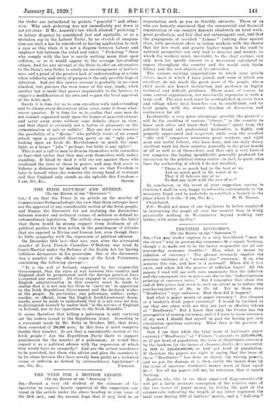THE IRISH REPUBLIC AND MURDER.
(To THE EDITOR OF THE "SPECTATOR."]
SIR,—I see that the Times in an article on the murder of Commissioner Redmond adopts the view that these outrages have not the approval of any considerable section of the Irish people, and blames the Executive for not realizing the distinction between murder and technical crimes of sedition as defined by extraordinary legislation. The article also expresses the belief that there would be strong support from Irishmen of all political parties for firm action in the punishment of felonies that are opposed to Divine and human law, even though there bo little sympathy with the repression of political offences.
On December 24th last—that was, soon after the attempted murder of Lord French—Cornelius Olfahony was tried by Court-Martial under the Defence of the Realm Act for having seditious documents in his possession. One of the documents was a number of the official organ of the Irish Volunteers, containing the following passage :—
"It is the will of Ireland, expressed by her responsible Government, that the state of war between this country and England shall be perpetuated until the foreign garrison have evacuated our country. All those engaged in carrying on the English administration in this country must be made to realize that it is not safe for them to carry on in opposition to the Irish Republican Government and the declared wishes of the people. In particular, any policeman, soldier, judge, warder, or official, from the English Lord-Lieutenant down- wards, must be made to understand that it is not wise for him to distinguish himself by undue 'zeal in the service of England in Ireland, nor in his opposition to the Irish Republic."
It seems therefore that killing a policeman is only carrying out the orders issued to the Republican Army. According to a statement made by Mr. Duke in October, 1917, that Army then consisted of 200,000 men; by this time it must comprise double that number. Is not that a considerable section of ths Irish people ? Are the Republican Party likely to support punishment for the murder of a policeman; or would they regard it as a political offence with the repression of which they would have no sympathy? And are the actual murderers to be punished, but those who advise and plan the murders tc be let alone because they have merely been guilty of a technical crime of sedition as defined by extraordinary legislation?—I


































 Previous page
Previous page